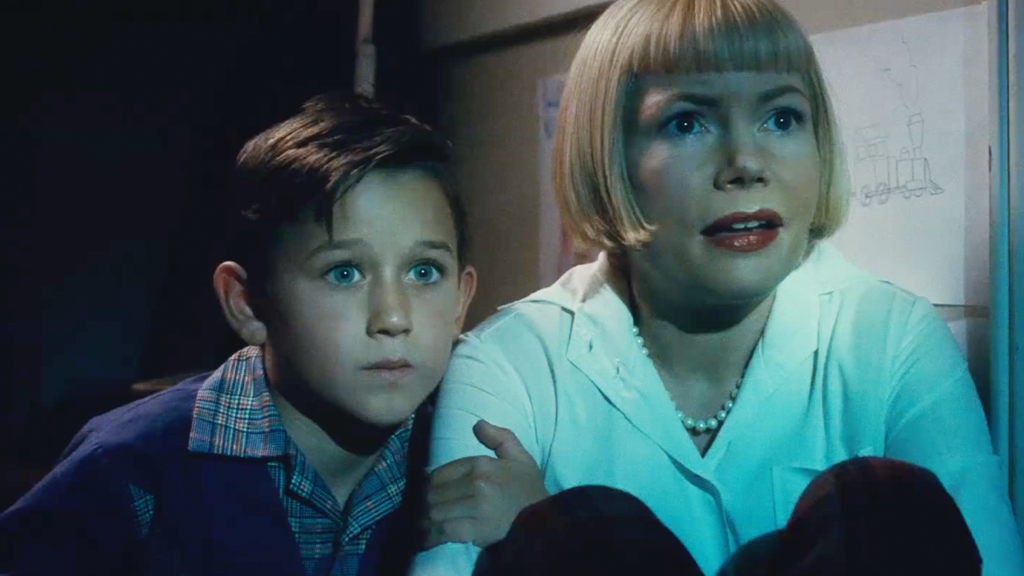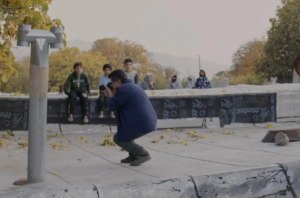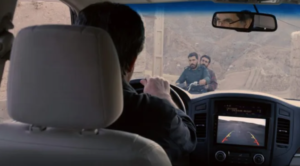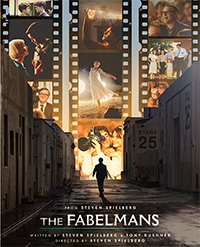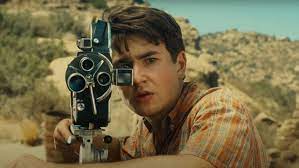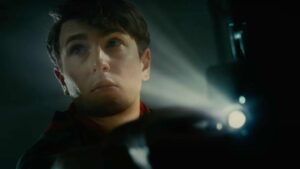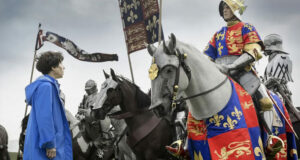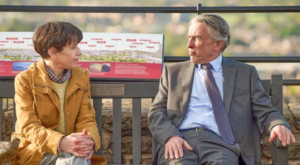No Bears aka Khers Nist | Written and Directed by Jafar Panahi | 106 min
On a recent episode of the podcast I cohost, LENS ME YOUR EARS, we watched and talked about a number of Iranian films, including a couple by activist filmmaker Jafar Panahi, The White Balloon and Taxi. I very much appreciate his thematic concerns, the struggle of the average Iranian citizen to live their lives as freely as possible despite conservative social and religious pressures — concerns that are currently seeing Panahi arrested and detained in his home country.
As he’s done in the past, Panahi blurs the line between fiction and docudrama. No Bears tells two parallel stories. In one, Panahi is attempting to shoot a film remotely, giving directorial instructions via Zoom to actors and crew in Turkey. A couple is looking to escape the country, but the required papers are difficult to secure for both at the same time, causing strife between them.
Meanwhile, Panahi unwittingly stokes controversy in the remote village he’s living in to avoid the Iranian authorities when the local sheriff demands he hand over a photo he took of a young couple — she’d been promised as a bride to one family when she was born, but she may be planning to elope with another man, which the photo is said to prove. Panahi says he doesn’t have the photo.
By inserting himself as a character into these stories, Panahi presents himself as a fall guy for the convoluted bureaucratic problems in his country — nothing is ever simple under the boot heel of unfair governmental laws or religious edicts. In this film, however, suggesting the dual tragedy of these two romantic tales, we’re kept at an arms length from them because Panahi has to put himself in foreground. He almost obscures what’s happening to other characters. Instead we learn things second or third hand, witnessing events through a distant windscreen. It’s alienating, but then, maybe that’s his intent.
The Fabelmans | Directed by Steven Spielberg | Written by Spielberg and Tony Kushner | 151 min
Considering this picture, last year’s Belfast, and another #TIFF22 entry, Empire of Light, there can be no doubt we’re catching a wave of senior filmmakers mining their childhoods for feature material. While those sources of inspiration are legit, so is the chance these movies will splash into a shallow puddle of sticky sweetness. Spielberg’s certainly been guilty of going mawkish in the past, and this semi-autobiographical story of a Jewish family in the 1950s and ’60s doesn’t entirely escape that fate, but it’s also a warm and engaging story.
Patriarch (Paul Dano) moves from New Jersey to Arizona to California as his computer engineering career grows, dragging his wife (Michelle Williams), four kids (including a boy, Sam, Spielberg’s avatar played by Gabriel Labelle), and buddy, Bennie (Seth Rogan), along with him. (With Williams and Rogan it’s a Take This Waltz reunion! #SarahPolleyIsQueen)
The first half of the film details young Sam’s obsession with filmmaking and his growing understanding of the fragility of his parents’ marriage. All of this is fine — and Williams is especially good here — but there’s nothing essentially special about this story. The kid has a passion and mom might be having an affair — so what? This doesn’t feel like particularly high stakes. A Judd Hirsch cameo feels like it strolled in from some other movie — Uncle Boris explains to Sam that committing yourself to a life in art means sacrifice. So far, this is an average episode of a sitcom.
Things improve mightily in the second half when the picture becomes a teen movie. Focusing on Sam’s high school experience it picks up some of Spielberg’s West Side Story energy — now in California, Sam has to navigate antisemitic lunkheads and the attention of a Jesus-loving classmate. I sort of wished the picture had just focused on this portion of the director’s life and maybe excised much of the first chapter.
You can enjoy The Fabelmans simply as a Jewish family comedy/drama — even as an apologia for divorce — though the echoes of Spielberg’s earlier work can be heard throughout if you’re paying attention, especially in the suburban milieu we saw in Close Encounters and ET — we even get a scene that takes place in the bedroom closet — and I’m sure I’m not the only one who thought of Raiders Of The Lost Ark when a monkey makes an appearance.
This isn’t the self-referential pastiche of Ready Player One, however. Spielberg’s really invested in this material, and by the end so was I.
The Lost King | Directed by Stephen Frears | Written by Steve Coogan and Jeff Pope | 108 min
The true life tale of the underdog showing the stuffy, academic establishment what for — Philippa Langley (Sally Hawkins) is the Scottish amateur historian who through diligent research and fundraising was able to locate the mortal remains of King Richard III buried beneath a car park in Leicester. It is a great story, but it’s also one that assumes a lot of its audience: That we have not only foreknowledge but foreinterest in this historical figure made famous by Shakespeare’s play — the film may reveal his bones, but they don’t do much to bring him to life. The movie makes the almost fatal error of having Philippa see King Richard (Harry Lloyd) as a silent, largely dull apparition, which, unfortunately, doesn’t work at all as a storytelling device.
While it’s no hardship spending time with Hawkins, who elevates the material with her sincerity, with welcome support by Coogan, James Fleet, and Mark Addy, this is simply middlebrow entertainment writ large. Given Frears’ excellent and gritty body of work, that’s surprising.
With a documentary on the same subject available, The King In The Car Park, I can’t say that might not be a better way to go. I wonder if it’s as critical as this film is of some of Philippa’s collaborators: reports suggest that the local university reps have been unfairly depicted here as the villains of the piece.





